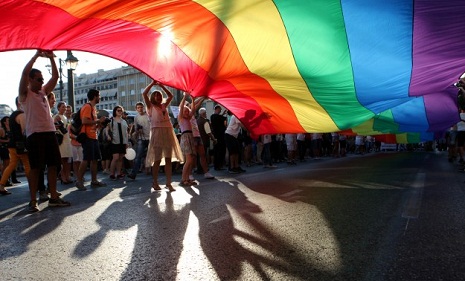“I was sorry to hear about your cancer," the letter began, "but maybe it is the will of God.
“After all you have been relentlessly pushing the twisted idea of gay marriage which would destroy the family as we know it and ruin the lives of generations of innocent children.”
The letter, which was shared thousands of times after Mullally posted it on Twitter, characterized an extremity of the debate in Ireland, a country where public discourse was for decades shaped by the Catholic Church.
On Friday it will become first country in the world to directly ask voters whether same-sex marriage should become legal.
“There is nothing to fear for voting for love and equality,” Enda Kenny, the country’s prime minister, told the national broadcaster RTE on Wednesday. “It is about getting the approach that the right of marriage under the civil law can be extended to people who do not have that.”
He continued: “It`s about asking yourself: `When I had the opportunity to extend equality of marriage to every citizen, what did I do?`”
His words are a milestone in Ireland’s social transformation that many say began only a generation ago. Sex between men only stopped being a criminal offence in 1993 and it took another three years before divorce was legalized.
But an economic boom in the mid- to late-1990s changed everything, not only generating wealth but transforming social attitudes. Multiculturalism increased as Ireland became a destination for immigrants after decades, perhaps centuries, of emigration.
Friday’s referendum demonstrates how much Church influence on Irish public opinion has declined – to the extent religion is not a major factor for any voter, according to Hasan Kaya, who has run a Turkish barber’s shop in the southern city of Cork for 12 years.
Speaking to Anadolu Agency, he said: “Everyone here is talking about it. People here are generally saying ‘yes’ because they want more freedom. Almost all my customers think the same.
“I have had one or two people in the shop who think negatively, and they said it was because it would affect families and children, not because of religion.”
That reflects the tone of the No campaign, which has shied away the extremities seen in the letter sent to Una Mullally. Indeed, the campaign has barely referred to Catholic teachings at all.
“There is more here to this proposal than simply equality,” said Brendan Leahy, a Catholic bishop based in Limerick in the country’s southwest, speaking to the BBC’s Newsnight programme on Wednesday night.
“Will we in public be allowed to speak in the future about marriage being a relationship between a man and a woman? What will we be teaching in our schools in the future? Will people be able to voice their conscience, their genuine belief that marriage is between a man and a woman?”
The No campaign is structured around retaining the traditional family unit: one poster argues children “deserve a mother and a father”. Another points to civil partnerships, which already recognize same-sex unions in law, as the reason why marriage should not be redefined.
The referendum is happening because the government wants to amend the definition of marriage in Ireland’s constitution. The public must be consulted on any constitutional change and ballots happen fairly often: Friday’s vote will be the seventh referendum in the last decade.
There will be more than one question this year as voters are asked whether they want to allow people aged under 35 to run for president, but it is same-sex marriage that has dominated this year’s referendum campaign.
Opinion polls indicate a strong lead for the Yes vote – albeit a narrowing one as undecided voters make up their minds.
Evangelical Christian communities claim there could be an upset as it rallies dozens of churches set up by African and eastern European immigrants, whose socially conservative views could sway the result.
And Paddy Monaghan, a lay Catholic leader in Dublin, told The Guardian there were many shy ‘no’ voters who were not expressing their view publicly.
He said migrants “would be a bit more nervous about expressing their true opinions but when it comes to voting they will get out there and vote no. That is one important reason why I think that the opinion polls have underestimated the support for no.”
But for other religious voices, the referendum is a question of individual rights. Stanislaus Kennedy, a prominent nun in Dublin, announced she was defying her own bishop to support a Yes vote.
She said in the Irish Times this week: “I have thought a lot about this. I am going to vote `yes` in recognition of the gay community as full members of society. They should have an entitlement to marry. It is a civil right and a human right.”
More about:
















































